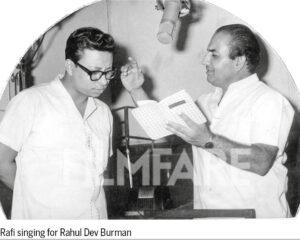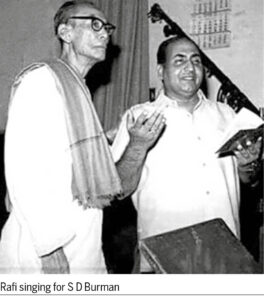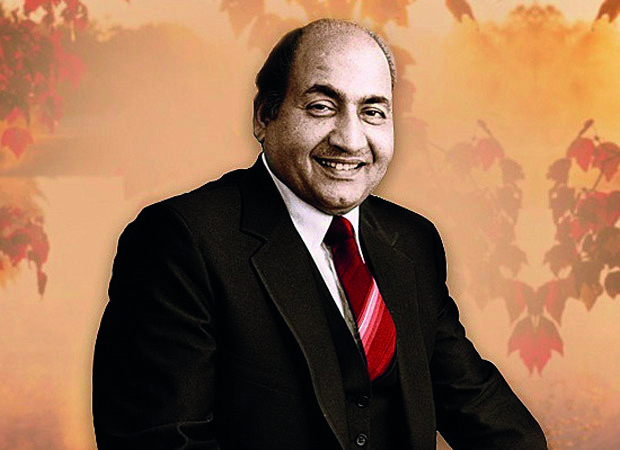On the 100th Birth Anniversary celebrations of Mohammed Rafi, inarguably one of India’s greatest singers, Hoshang K Katrak pays a tribute to the celebrated singer and explores his enigmatic relationship with the father-son composer duo – Sachin Dev Burman and Rahul.
 As the nation celebrates the maestro’s 100th birth anniversary on 24th December, my thoughts drift towards the celebrated singer’s association with music directors – particularly with Sachin Dev Burman and his son Rahul. While some composers such as Ravi, Hansraj Behl, Chitragupt, Iqbal Qureshi, Sonik-Omi could not look beyond Rafi, the majority of music directors, especially small-time and debutants, reposed utmost confidence in him. However, it may come as a surprise that composers Anil Biswas, Salil Choudhary, SD Burman and RD Burman were not particularly enamoured with his voice.
As the nation celebrates the maestro’s 100th birth anniversary on 24th December, my thoughts drift towards the celebrated singer’s association with music directors – particularly with Sachin Dev Burman and his son Rahul. While some composers such as Ravi, Hansraj Behl, Chitragupt, Iqbal Qureshi, Sonik-Omi could not look beyond Rafi, the majority of music directors, especially small-time and debutants, reposed utmost confidence in him. However, it may come as a surprise that composers Anil Biswas, Salil Choudhary, SD Burman and RD Burman were not particularly enamoured with his voice.
A short digression: Mohammed Rafi shared a genial rapport with Parsees – Cawas Lord (fondly called ‘Cawas Kaka’), his sons, Burjor and late Kersi, late Homi Mullan, Bahadur Nanji, Kersi Mistry and Vistasp Balsara, were all acclaimed musicians, who had shared the recording room with Rafi, with the latter two being music composers themselves. Then there was also the renowned sound recordist, Minoo Katrak, without whose technical wizardry singers would not have sounded the way they did!
But back to the Burmans… while Salil Choudhary, R D Burman and to an extent, C Ramchandra (who, like his mentor Anil Biswas, had an antipathy towards Rafi) displayed an overt tendency to look beyond Rafi, the situation in Sachin Dev Burman’s case is quite piquant. The facts speak for themselves – SDB employed Rafi for the first time in ‘Do Bhai’ (1947). In the ten years ‘Pyaasa’ (1957), Rafi’s contribution was just 11 out of 83 songs by male singers, under SDB. But in the 12 years between ‘Pyaasa’ and ‘Aradhana’ (1969), the composer depended heavily on Rafi – with 70 of 133 male songs sung by Rafi. This, during the phase when he also alternated between Kishore Kumar’s and Hemant Kumar’s vocals (‘Na tum hamen jaano’, ‘Hai apna dil toh awaara’), especially for the evergreen Dev Anand.
 Which brings up a pertinent question: who made Dev Anand – Rafi or Kishore? Just hear the songs of Hum Dono, Jab Pyar Kisise Hota Hai, Love Marriage, Maya, Asli Naqli, Kala Pani, Bambai ka Babu, Tere Ghar ke Saamne, Kala Bazaar and Guide (the last 5 films, ironically, by SDB), and you have a bouquet of unmatchable dulcet songs. This should debunk the myth that Kishore elevated Dev Anand to the exalted status the latter enjoyed. Kishore merely carried on from the lofty pedestal Rafi created for Dev. SD Burman’s songs by Kishore for Dev Anand were breezy and exuberant, while Rafi’s were mellow and soothing. For proof, simply rewind to the songs of Teen Deviyan (1965) where the astute composer pitted the two singers against each other for Dev Anand, with Kishore singing ‘Arey yaar meri tum bhi ho ghazab’ and ‘Khwaab ho tum ya koi haqeeqat’; and Rafi was given the sublime ‘Kahin bekhayaal hokar’ and ‘Aise toh na dekho’.
Which brings up a pertinent question: who made Dev Anand – Rafi or Kishore? Just hear the songs of Hum Dono, Jab Pyar Kisise Hota Hai, Love Marriage, Maya, Asli Naqli, Kala Pani, Bambai ka Babu, Tere Ghar ke Saamne, Kala Bazaar and Guide (the last 5 films, ironically, by SDB), and you have a bouquet of unmatchable dulcet songs. This should debunk the myth that Kishore elevated Dev Anand to the exalted status the latter enjoyed. Kishore merely carried on from the lofty pedestal Rafi created for Dev. SD Burman’s songs by Kishore for Dev Anand were breezy and exuberant, while Rafi’s were mellow and soothing. For proof, simply rewind to the songs of Teen Deviyan (1965) where the astute composer pitted the two singers against each other for Dev Anand, with Kishore singing ‘Arey yaar meri tum bhi ho ghazab’ and ‘Khwaab ho tum ya koi haqeeqat’; and Rafi was given the sublime ‘Kahin bekhayaal hokar’ and ‘Aise toh na dekho’.
Can anyone visualise the 3 Rafi solos in ‘Guide’ in anybody but Rafi’s voice! ‘Tere mere sapne’, ‘Din dhal jaaye’, and ‘Kya se kya ho gaya’? A little known fact is that both, Dev Anand and director (and brother) Vijay Anand wanted Kishore to sing the male songs of Guide, but the composer wouldn’t have it as he had composed these with Rafi in mind. As a compromise, the duet ‘Gaata rahe mera dil’ was sung by Kishore under the supervision of son RD Burman as the senior Burman was ill at the time.
It’s sheer poetic injustice to Rafi that after Aradhana, SD Burman invited Rafi for only 10 of the 80 songs he composed for male singers, including the 3 solos – Mehbooba teri tasveer (Ishq Par Zor Nahin), Mera man tera pyaasa (Gambler) and Aye mere man (Us Paar); and 3 equally super duets with Lata – Aajko junili raatma (Talash), Yeh dil diwana hai (Ishq Par Zor Nahin) and Tere mere milan ki yeh raina (Abhiman).
As for Burman Jr., or ‘Panchamda’, if dad played the tactful balancing act amid Rafi, Kishore and Hemant Kumar, son RD had no qualms about showing his indifference towards Rafi, despite the composer maxing the popularity charts on the strength of Rafi’s vocals in the chartbuster Teesri Manzil (1966). Even in Pancham’s debut film, Chhote Nawab (1961), Rafi sung 6 of 8 songs. Till 1969, Rafi had sung 28 songs off 11 films. Taking 1969 as the cut-off year, as after Sachinda fell ill, after having recorded the 2 Rafi duets in Aradhana (1969), it was left to his son to decide on the singer for the remaining songs. And he, without hesitation, beckoned his favourite – Kishore for the remaining 3 songs. In the nearly 200 films, till Rafi passed in 1980, he was given a mere 92 songs.
Post 1969, for the Burmans, it was mostly Kishore all the way. However, RD would have sorely felt Rafi’s absence in Sunny Deol’s debut film Betaab (1983), with Rafi clone, Shabbir Kumar, singing all 5 songs in the film. After 1983, Pancham’s output of 100 films was forgettable, barring a handful of films like Saagar, Ijaazat and 1942 A Love Story.
Generous to a fault, the God-fearing, self-effacing Rafi, who would sing for rookie composers for a token rupee, was the jewel of playback singing for 36 years. There’s no doubt that one will never get to see or hear another Mohammed Rafi. In conclusion, I’m reminded of his 1964 song from ‘Kashmir ki Kali’: Taarif karoon kya uski, jisne Tumhe banaaya!
- Sau Saal Pehle… Celebrating Mohammed Rafi’s Birth Centenary - 21 December2024
- Parsee Gym Retains Supremacy In 7th Late Manek Golvala T10 Cricket Cup - 13 April2024
- Parsee Gym Holds 9th All-Parsee TT Tourney - 6 April2024
